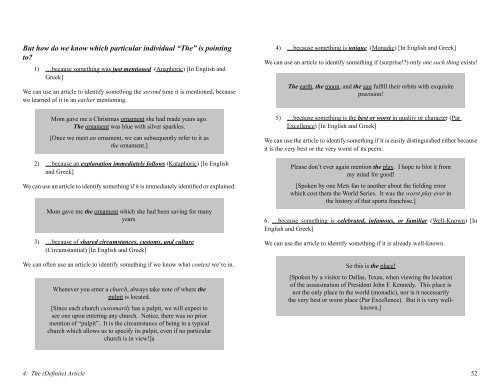Elementary New Testament Greek, 2014a
Elementary New Testament Greek, 2014a
Elementary New Testament Greek, 2014a
Create successful ePaper yourself
Turn your PDF publications into a flip-book with our unique Google optimized e-Paper software.
But how do we know which particular individual “The” is pointing<br />
to?<br />
1) …because something was just mentioned (Anaphoric) [In English and<br />
<strong>Greek</strong>]<br />
We can use an article to identify something the second time it is mentioned, because<br />
we learned of it in an earlier mentioning.<br />
Mom gave me a Christmas ornament she had made years ago.<br />
The ornament was blue with silver sparkles.<br />
[Once we meet an ornament, we can subsequently refer to it as<br />
the ornament.]<br />
2) …because an explanation immediately follows (Kataphoric) [In English<br />
and <strong>Greek</strong>]<br />
We can use an article to identify something if it is immediately identied or explained.<br />
Mom gave me the ornament which she had been saving for many<br />
years.<br />
3) …because of shared circumstances, customs, and culture<br />
(Circumstantial) [In English and <strong>Greek</strong>]<br />
We can often use an article to identify something if we know what context we’re in.<br />
Whenever you enter a church, always take note of where the<br />
pulpit is located.<br />
[Since each church customarily has a pulpit, we will expect to<br />
see one upon entering any church. Notice, there was no prior<br />
mention of “pulpit”. It is the circumstance of being in a typical<br />
church which allows us to specify its pulpit, even if no particular<br />
church is in view!]a<br />
4) …because something is unique (Monadic) [In English and <strong>Greek</strong>]<br />
We can use an article to identify something if (surprise!?) only one such thing exists!<br />
The earth, the moon, and the sun fulll their orbits with exquisite<br />
precision!<br />
5) …because something is the best or worst in quality or character (Par<br />
Excellence) [In English and <strong>Greek</strong>]<br />
We can use the article to identify something if it is easily distinguished either because<br />
it is the very best or the very worst of its peers.<br />
Please don’t ever again mention the play. I hope to blot it from<br />
my mind for good!<br />
[Spoken by one Mets fan to another about the elding error<br />
which cost them the World Series. It was the worst play ever in<br />
the history of that sports franchise.]<br />
6. …because something is celebrated, infamous, or familiar (Well-Known) [In<br />
English and <strong>Greek</strong>]<br />
We can use the article to identify something if it is already well-known.<br />
So this is the place!<br />
[Spoken by a visitor to Dallas, Texas, when viewing the location<br />
of the assassination of President John F. Kennedy. This place is<br />
not the only place in the world (monadic), nor is it necessarily<br />
the very best or worst place (Par Excellence). But it is very wellknown.]<br />
4: The (Denite) Article<br />
52


















